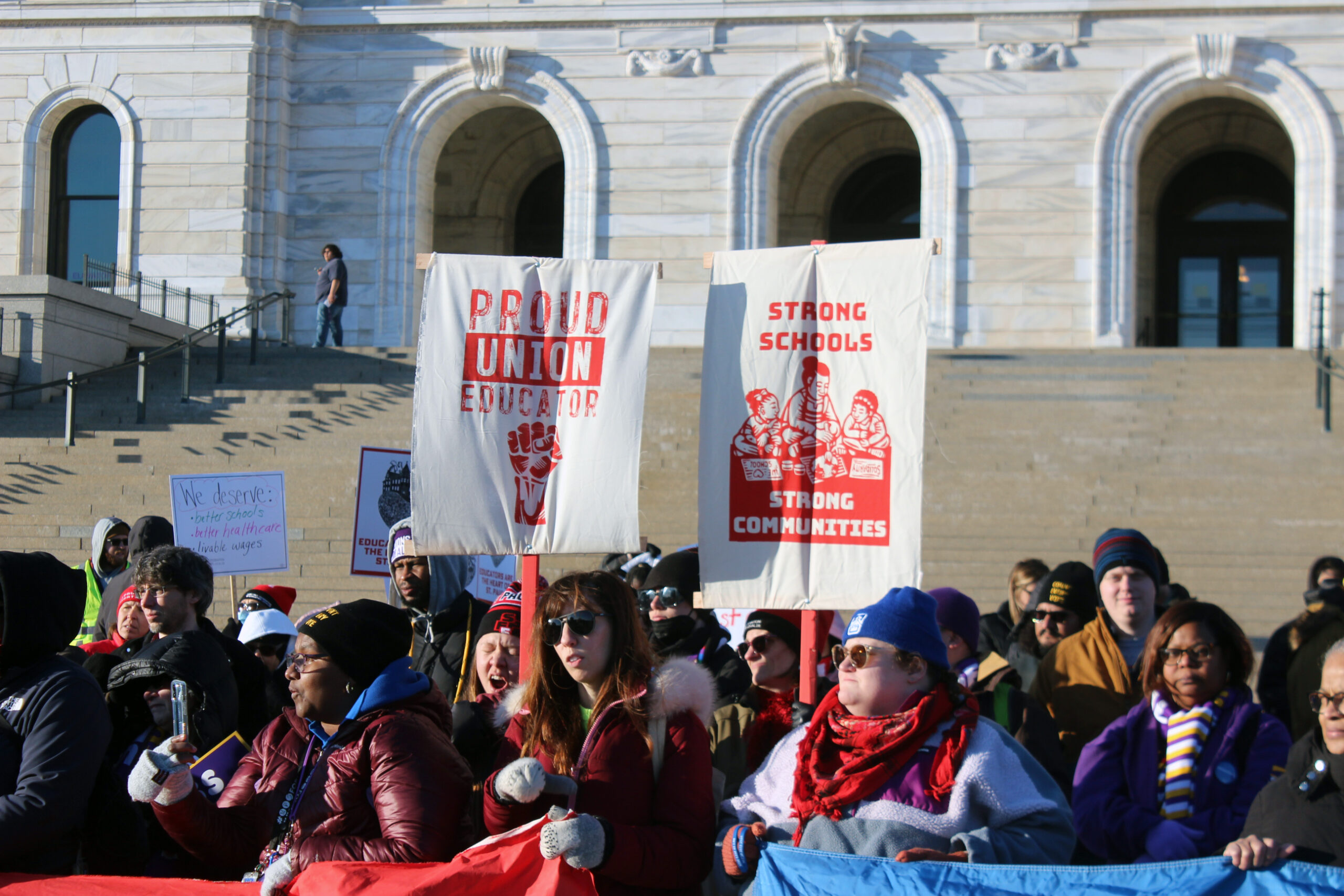
Teachers and hourly school workers rally in front of Minnesota’s state capitol on March 8, 2024, as part of a week of action demanding better contracts for workers and their community. Photo by Amie Stager.

Share
Saint Paul Public Schools teacher Michou Tchoffo came to the U.S. as an immigrant in 2016 and has worked at Highwood Hills Elementary for three years. “I’m thinking about the mental health of our families and students right now,” she says. “Parents ask, ‘Do I have to send my kids to school?’ They are scared, and we can feel it.”
Union members are building protections against threats from the Trump administration’s recent authorization of raids targeting places such as schools. In January, members of Saint Paul Federation of Educators (SPFE) Local 28 organized an Immigration Defense Committee to take action and stand in solidarity with the immigrant community in St. Paul, Minn. They are planning know-your-rights trainings and emergency resources for teachers and families.
According to a union spokesperson, SPFE has been educating members on the agenda of another Trump administration, including its threats against immigrants and working people. In a slew of executive orders during the first week back in office, the administration overturned a 13-year-old policy banning immigration enforcement from interfering in essential services at schools, hospitals, and churches.
On January 21, Acting Department of Homeland Security (DHS) Secretary Benjamine Huffman issued a directive rejecting the previous Biden administration’s guidelines for Immigration Customs and Enforcement (ICE) that banned enforcement in “sensitive” areas. According to a DHS spokesperson, “Criminals will no longer be able to hide in America’s schools and churches to avoid arrest.” Many studies have found that there is no link between immigration status and crime and that immigrants are less likely to be incarcerated than those born in the U.S.
President of SPFE Local 28 Leah VanDassor released a statement on January 21, stating, “There will be calls that we should ‘moderate’ our goals – focus on economics and ignore everything else. To just put our heads down and try to get by. Some may have that option. But we don’t. To do these things would put many of our members, our students, their families, and potentially, our union, at even greater risk.”
The Migration Policy Institute estimates there are around 11.2 million undocumented immigrants in the U.S. as of 2021. According to the Vera Institute of Justice, 163,500 people in Minneapolis-St. Paul are at risk of deportation.
In the Twin Cities, more than 220,000 children under age 20 have one or more immigrant parent, according to Minnesota Compass, which tracks demographic data and trends using the U.S. Census Bureau’s American Community Survey (ACS). This means that one in five children have immigrant parents.
When the Trump administration first took office in 2017, Saint Paul Public Schools adopted a resolution ensuring equal education for students regardless of immigration status. Tchoffo says that the Immigrant Defense Committee will advocate for updated policies protecting students.
According to data from the U.S. Census Bureau’s ACS, the foreign-born population in the St. Paul Public School District is 18.2%, more than double than the rate for the rest of Minnesota at 8.6%. Last year, the Sahan Journal reported that increased enrollment trends in the district can be attributed to a focus on language and cultural diversity programs.
Tchoffo said support from mentors and community helped her through rough times after coming to the U.S. “You are in a new system that is totally different, you struggle with little steps,” she says. “I want them to feel like, ‘yes, I’m American, but yes, I’m an immigrant too,’ and be able to stand up for themselves.”

